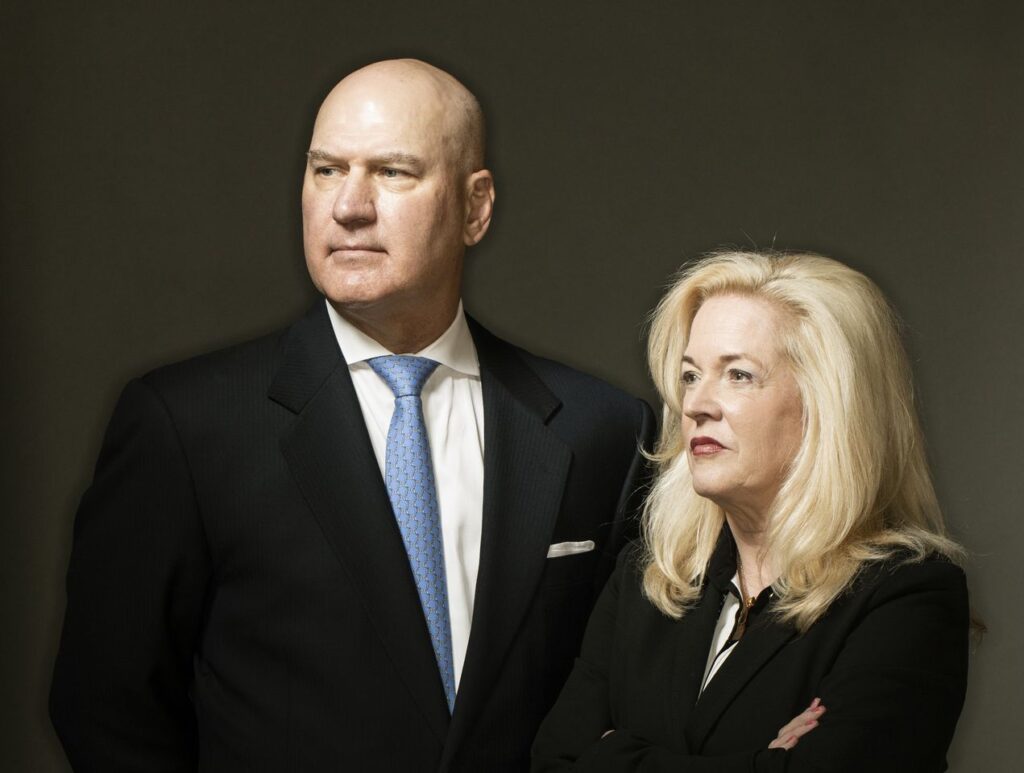
Husband-and-wife team has carved a niche selling nonperforming loans, which have grown rapidly in several countries, including Ukraine
By Tess Riski and Konrad Putzier | Photo by Brett Deering for The Wall Street Journal
https://www.wsj.com/articles/latest-oklahoma
After years of war and economic malaise, Ukraine is struggling under a mountain of bad loans. Now the crisis is creating a business opportunity for an Oklahoma family company.
Oklahoma City’s First Financial Network, run by the husband-and-wife team of John and Bliss Morris, has carved out a niche selling nonperforming loans—many of them real-estate—in countries like Mexico, Nicaragua, Spain and the U.S.
“We get asked, ‘Why Oklahoma?’ a lot,” Mr. Morris said.
“If you understand our background, it’s not that unique,” Ms. Morris said. She had years of experience working with the Federal Deposit Insurance Corp., starting in 1985 when the federal agency’s largest liquidation bank was located in Oklahoma City. “We have made a reputation for ourselves. For decades, this is what we’ve done.”
One of First Financial’s largest portfolios includes Chernomorets Stadium in Odessa, Ukraine. PHOTO: PETER CZIBORRA/REUTERS
Business is booming. The volume of nonperforming loans as a percentage of total loans grew rapidly in several countries between 2010 and 2017, according to a February report by the World Bank, particularly in Europe, Central Asia and Africa.
No country has a higher share of bad loans than Ukraine, which is still recovering from a severe recession in 2014 and 2015.
In May, the country elected a new president, Volodymyr Zelensky, who vowed to eliminate the widespread corruption that was blamed for exacerbating the country’s financial crisis.
“The situation in Ukraine is a mess,” said Taras Yeleyko, the head of the consolidated sales office of Ukraine’s Deposit Guarantee Fund, which, similar to the FDIC, protects bank depositors.
In 2015, the U.S. Treasury Department asked the Morrises to bring their financial expertise to the Eastern European country, where 96 out of 182 banks failed and a staggering 52% of loans are nonperforming, Mr. Yeleyko said.
“According to the law, we are obligated to sell them,” Mr. Yeleyko said of the bad loans. But doing so has proven to be a challenge.
Ukraine’s banking sector was hit hard by the 2008 global financial crisis, which left many lenders on shaky footing. Then came a second, bigger shock: the 2014 revolution that toppled then-president Viktor Yanukovych ’s government, followed by the Russian annexation of Crimea and a war in the east that plunged the country into a recession.
Many of the 96 failed banks’ assets ended up in the hands of the Deposit Guarantee Fund. In 2015, a team of U.S. government experts working to help Ukraine recover moved into the offices of the Guarantee Fund and put it in touch with the Morrises.
Sharon Easky, who headed the team but no longer works for the U.S. government, said the Morrises’ online bidding system provides a level of transparency and competition that can combat bad actors.
Auction participants can access First Financial’s proprietary bidding system online at all hours of the day. According to Ukrainian law, the bidding must follow “Dutch auction” rules, whereby the price is reduced from the initial asking amount until a buyer is found.
“It is a key mechanism to prevent corruption in the future,” Ms. Easky said of First Financial’s online bidding system. “In addition to just opening up the markets and bringing investors in and moving product to market, [First Financial] brings a process that truly is hard to manipulate.”
Ukraine’s financial crisis was unusual. Many failed banks had been owned by oligarchs, who used them to funnel loans to their own businesses at favorable terms with little security, said Vitaliy Kravchuk, a senior research fellow at the Kyiv-based think tank Institute for Economic Research and Policy Consulting.
When these loans ended up at the Deposit Guarantee Fund, they were worth much less than their book value.
In August, First Financial auctioned off a portfolio of 290 of Ukraine’s nonperforming loans collateralized by commercial, industrial and residential real estate, vehicles and equipment. It had a balance of $416 million and sold for $3.5 million, less than 0.9% of the book value.
Little is available online about the portfolio’s buyer, Financial Company Helios, which was formed for the specific purpose of buying these types of assets.
Similar challenges may be on the horizon for the group’s coming auctions. One of First Financial’s largest portfolios includes Chernomorets Stadium in Odessa, which was previously owned by the failed Imexbank, which Deposit Guarantee is liquidating. The portfolio, with a balance of $540 million, also includes a 5-star hotel, retail-and-office space and a city sports museum.
Deposit Guarantee has put the stadium up for auction several times in recent years, to no avail. An August auction by First Financial again failed to find a buyer.
Built for the 2012 Union of European Football Associations tournament, the 35,000-seat stadium was once a symbol of Ukraine’s modernization. Now it may be a tough sell in part because Ukraine’s economic malaise is hurting demand for concerts and similar events, said Mr. Kravchuk.
Write to Tess Riski at Tess.Riski@wsj.com and Konrad Putzier at konrad.putzier@wsj.com